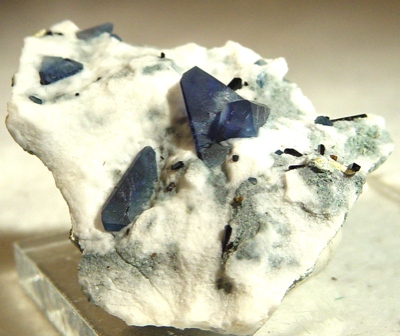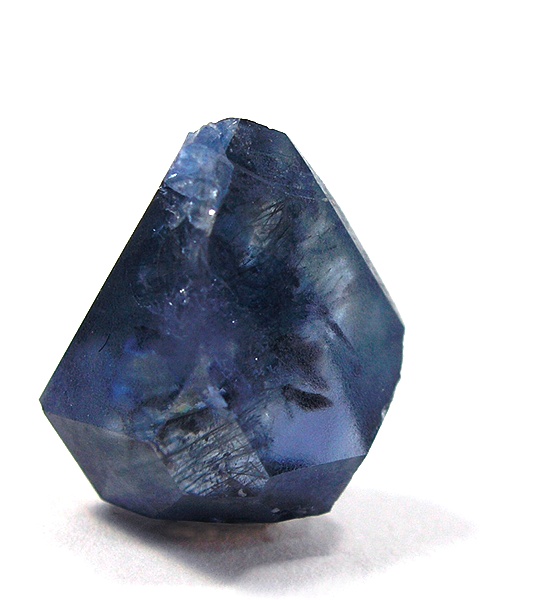 |
| Benitoite in a matrix of neptunite from San Benito County, California. Photo by Rob Lavinsky |
Benitoite is a
one-of-a-kind gem since it is only found in one place in California California
As a mineral benitoite was described in 1907 by George D.
Louderback who named it benitoite because it was found near the headwaters of
the San Benito River of San Benito County, California
 |
| A single crystal of benitoite in matrix. Photo by Lech Darski |
This stone is usually found an unusual set of minerals
including the minerals that make up its host rock. The associated minerals
usually include naturolite, neptunite, joaquinite, serpentine and albite.
Benitoite is very rare mineral that is only found that it few locations among
them are places in San Benito County , California Arkansas Japan Clearwater California
This gemstone is typically colored various shades of blue
although it can also appear as colorless or even have a yellowish caste. Its crystals can vary from transparent to
translucent with visible inclusions with a vitreous luster.
 |
| A single crystal of benitoite with no matrix. Photo by Rob Lavinsky |
When found its crystals are hexagonal; bar 6 m 2 that in
crystal habits include six place dipyramid flattened shapes having a distinct
triangle shape that is often modified by having minor faces. At times it is also found as small grains.
Benitoite has no cleavage and its fracture is irregular. Other distinguishing features are its
hardness ranging from 6 to 6.5 on the Moh’s scale of hardness. Its specific gravity is 3.6 making it denser
then most other minerals making it capable of being separated by gravity
methods such as panning. The mineral
also displays a white streak.
 |
| A faceted example of benitoite Photo by Fastily |
This mineral is counted among those that fluoresce under the
influence of ultraviolet light displaying a blue light. Minerals that are associated with benitoite
include serpentine, neptunite, natrolite, joaquinite, sanbornite, taramellite,
albite and fresonite.
Benitoite gems are only found in three mines located in San
Benito County , California Texas California
_.jpg/800px-B%C3%A9nitoite_sous_U.V._(USA)_.jpg) |
| Benitoite under ultraviolet light. Photo by Parent Gery |
If you are searching for this mineral the best field
indicators its crystal habit, the fact that it displays fluorescence in blue,
its distinctive color, the minerals it is associated with and the locality. The fact it is associated with bodies of
serpentine suggests that it might be found in localities that have been
identified as suture
zones where geologists feel that serpentine is metamorphosed oceanic crust
that has been caught up in earth movements associated with the collision of two
continental plates,
Wow, this stone is such beautiful and unique powers! I love the geometric shapes and slightly tarnished look. What a great find :) visit our Silver Gemstone jewelry Collection .
ReplyDelete